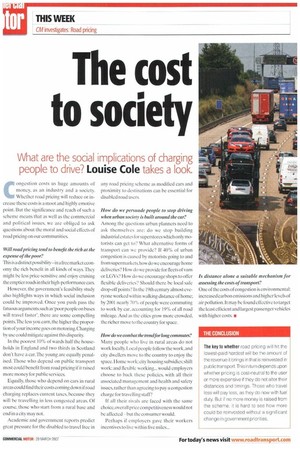The cost to society
Page 26

If you've noticed an error in this article please click here to report it so we can fix it.
What are the social implications of charging people to drive? Louise Cole takes a look.
Con gestion costs us huge amounts of money, as an industry and a society. Whether road pricing will reduce or increase these costs is a moot and highly emotive point. But the significance and reach of such a scheme means that as well as the commercial and political issues, we are obliged to ask questions about the moral and social effects of road pricing on our communities.
Will road pricing tend to benefit the rich at the expense of the poor?
This is a distinct possibility— in a free market economy the rich benefit in all kinds of ways. They might be less price-sensitive and enjoy cruising the emptier roads in their high-performance cars.
However, the government's feasibility study also highlights ways in which social inclusion could be improved. Once you push pass the fatuous a rguments.such as 'poor people on buses will travel faster', there are some compelling points.The less you earn, the higher the proportion of your income goes on motoring. Charging by use could mitigate against this disparity.
In the poorest 10% of wards half the households in England and two thirds in Scotland don't have a car. The young are equally penalised. Those who depend on public transport most could benefit from road pricing if it raised more money for public services.
Equally, those who depend on cars in rural areas could find their costs coming down if road charging replaces current taxes, because they will be travelling in less congested areas. Of course, those who start from a rural base and end in a city may not.
Academic and government reports predict great pressure for the disabled to travel free in any road pricing scheme as modified cars and proximity to destinations can be essential for disabled road users.
How do we persuade people to stop driving when urban society is built around the car? Among the questions urban planners need to ask themselves are: do we stop building industrial estates forsuperstores which only motorists can get to? What alternative forms of transport can we provide? If 40% of urban congestion is caused by motorists going to and from supermarkets. how do we encourage home deliveries? How do we provide for fleets of vans or LGVs? How do we encourage shops to offer flexible deliveries? Should there be local safe drop-off points? In the 19th century almost everyone worked within walking distance of home; by 2001 nearly 70% of people were commuting to work by car, accounting for 19% of all road mileage. And as the cities grow more crowded, the richer move to the country for space.
How do we com bat the trendfor long commutes? Many people who live in rural areas do not work locally. Local people follow the work, and city dwellers move to the country to enjoy the space. I lome work: city housing subsidies; shift work: and flexible working... would employers choose to back these policies, with all their associated management and health and safety issues, rather than agreeing to pay a congestion charge for travelling staff?
If all their rivals are faced with the same choice,overal I price competitiveness would not be affected—but the consumer would.
Perhaps if employers gave their workers incentives to live within five miles... Is distance alone a suitable mechanism for assessing the costs oftransport?
One of the costs of congestion is environmental: increased carbon emissions and higher levels of air pollution. It may be found effective to target the least efficient and largest passenger vehicles with higher costs.
























































































































































































